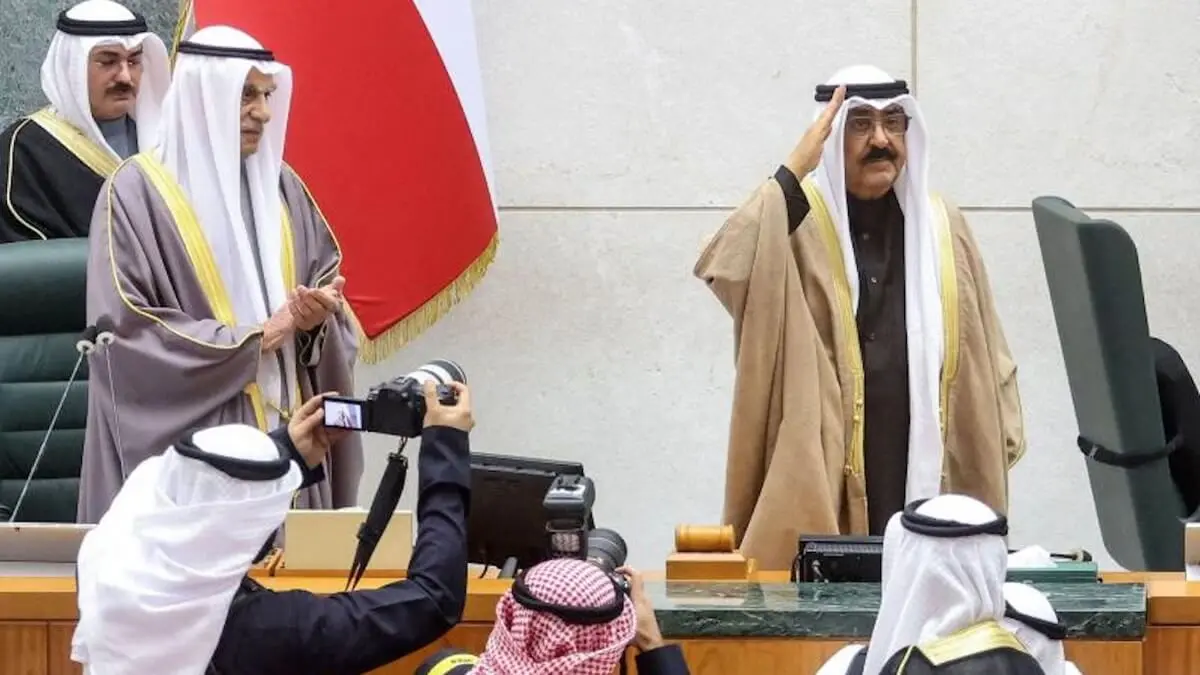Fixing Kuwait’s woes

Faced with conflicting political pressures, Kuwaitis tend to focus more on what divides them than on what unites them. Throughout the years, the Kuwaiti National Assembly has turned into an arena of conflict and questioning of officials, leading to its dissolution more than once.
With each election cycle and cabinet formation, Kuwait had to revert to an unclear political and development starting point, which caused the country to regress compared to regional development and progress standards. Developments led the country to discover such notions as budget deficits and the need to tap into sovereign investment funds to meet the needs of state spending.
When disputes went beyond mere talk about Kuwait’s development prospects and reached the point of people doubting the state’s ability to fund government operational spending in terms of salaries and the maintenance of municipal infrastructure and financing health, education and defence budgets, it is then that everyone felt that the situation had become untenable and it was imperative to overcome political chaos which was best illustrated by the climate of parliamentary sessions.
The emir of Kuwait, Sheikh Meshal Al-Ahmad Al-Jaber Al-Sabah, took the decision recently to dissolve the National Assembly and suspend certain provisions of the constitution for a period not exceeding four years. Holding parliamentary elections in Kuwait once again would have thrown Kuwait, its government, its MPs and its people into the same old turmoil. It is too early to tell whether the pause that Sheikh Meshal Al-Ahmad has reserved for himself and for his people will provide him with enough time to introduce the profound constitutional reforms that are needed to prevent anarchy from once again gripping the National Assembly. It should be ample time. But Kuwaitis are in any case tired of being mired in an ever-widening spiral with every election cycle: cabinet formation, questioning sessions for government members, and then eventually the dissolution of parliament.
Sheikh Meshal Al-Ahmad took the decision to dissolve the National Assembly and suspend provisions of the constitution. He then appointed Sheikh Sabah Al-Khaled Al-Hamad Al-Sabah as crown prince. Observers of Kuwaiti politics have noted the favourable domestic welcome which this appointment has received. Sheikh Sabah Al-Khaled is a veteran political figure who enjoys a lot of respect for his governmental and political experience. Over the decades, he has held senior positions in the country’s government, including key portfolios of foreign affairs, media and national security. He also served as his country’s ambassador to the United Nations and Saudi Arabia. Perhaps Sheikh Sabah Al-Khaled’s tenure as prime minister for more than two years was the most challenging of the positions he held. It gave him a perspective on the crises besetting relations between the government and the National Assembly, which reached their apex during the illness of the then-emir, Sheikh Nawaf Al-Ahmad Al-Jaber Al-Sabah.
The Al-Hamad Al-Sabah branch of Kuwait’s ruling family has become the safety valve for the authorities, and a guarantor of the credibility of the state and the ruling family, with the presence of Sheikh Sabah Al-Khaled at the head of the government, his brother Sheikh Ahmed Al-Khaled as deputy prime minister and minister of defence and his brother Sheikh Mohammed Al-Khaled as deputy prime minister and minister of interior. Cohesion within this branch of the ruling family, which was not interested in competing for the position of crown prince, provided the then-deputy emir, Sheikh Meshal Al-Ahmad, who was later the state’s emir, with the opportunity to send warning messages to the political actors jockeying for influence within the National Assembly and the ruling family. He then decided to dissolve the legislature, suspend provisions in the constitution, and finally appoint a crown prince.
There is no doubt that the recent decision to appoint Sheikh Sabah Al-Khaled as crown prince was a departure from the prevailing custom of keeping that position in the hands of the Al-Ahmad and Al-Salem branches of the ruling family. It had been further restricted to the Al-Ahmad branch alone. But divisions within the ruling family left enough wiggle room to manoeuvre and choose between various options. The fate of Kuwait itself was at stake when ambitious members of the ruling family used political tools, including partisan and tribal groups, Muslim Brotherhood, Salafist and pro-Iranian formations, to spark confrontations within the National Assembly.
The ongoing calm in Kuwait today raises the most important question of all: how can Sheikh Sabah Al-Khaled, with his distinguished reputation and experience, find a solution to the dilemmas of politics, governance and authority in Kuwait?
In answering this question, one should look back at events in 2006, a pivotal year in the contemporary history of Kuwait.
During that year, not only was the late Sheikh Sabah Al-Ahmad Al-Jaber Al-Sabah installed as emir of Kuwait (after Sheikh Saad Al-Abdullah Al-Salem Al-Sabah abdicated), but the idea of separating the position of crown prince from that prime minister was reaffirmed. This was not only due to Sheikh Saad Al-Abdullah’s illness. Sheikh Sabah Al-Ahmad assumed the premiership in 2003 after the health of Crown Prince and Prime Minister Sheikh Saad Al-Abdullah deteriorated. The measure seemed at the time only temporary. It was presumed that a new emir assuming power, with a designated crown prince beside him, would restore the custom of entrusting the premiership to the crown prince. But that position went instead to Sheikh Nasser Al-Mohammed Al-Ahmad Al-Jaber Al-Sabah, who held the position for more than five years. Subsequently, six prime ministers took over the position at different stages of the cycles following election and dissolution of the National Assembly. With the appointment of new prime ministers, some of whom remained in office for less than a year due to crises stemming from the cycle of appointments, parliamentary questioning and then resignation, Kuwait has gone through unprecedented instability, which was at variance with the norms of the Gulf region, where ministers usually remain in office for many years. This gives them ample time to implement government and development programs without major distractions.
In more than one Gulf country, the position of crown prince is tied to post of prime minister. That was the case in Saudi Arabia. Then, the king became the prime minister before the position was again entrusted with the crown prince. In Bahrain, the position was linked to the crown prince at the end of Sheikh Khalifa bin Salman Al Khalifa’s era. In the UAE, the crown prince of each emirate chairs its executive council, which offers a local version of the federal cabinet. The executive council in each emirate runs local government, taking into consideration the prerogatives of the federal government.
In Kuwait, the desire to prevent offending remarks against the crown prince, as the country’s next in line to be emir, during National Assembly questioning sessions, was one of the arguments used to justify the separation of the position of crown prince from that of prime minister. It is true that prime ministers in Kuwait were picked from among leading members of the ruling family, but these prime ministers were not usually candidates for the position of crown prince. What happened, however, is that the separation between the two positions not only led to offensive remarks to the prime minister to increase during questioning sessions, but it also made it easier to assail the emir, himself. MPs indulged themselves in questioning sessions. They began challenging the decisions of the emir. Sheikh Meshal Al-Ahmad warned them against this practice to which he later referred when he announced the dissolution of the National Assembly and the suspension of provisions in the constitution. The argument that separation helped shield the dignity of the emir failed on more than one occasion.
Kuwait now stands at a turning point. Its emir is a politically bold leader. The crown prince is endowed with long governmental and political experience. But the crown prince, according to the current custom of separating the positions of crown prince and prime minister, will be without executive powers which could have allowed him to take part in the broad reform process that Kuwaitis are waiting for and which the emir and an increasing number of the ruling family members is seeking. This situation is likely to deprive Kuwait of taking advantage of the potential which Sheikh Sabah Al-Khaled’s experience could offer and which the country needs at this sensitive stage.
There is no doubt that a decision such as reintroducing the customary practice of entrusting the crown prince with the task of leading the government would require consensus within the ruling family and among influential political circles in Kuwait. But this could be one of the best ways of conducting the reform process. One should note that in the current government line-up, the ruling family holds only two top cabinet positions, those of prime minister and deputy prime minister, with the last assuming also the interior and defense portfolios. This means that the ruling family is almost completely devoid of much of the executive powers. Furthermore, it has left posts, including important government positions, to be assumed by veteran government members from outside the ruling family. This is likely to expand the momentum of reform and change before eventually reactivating the suspended provisions of the constitution and paving the way for parliamentary elections and the return to a calmer and more serene political life.
This kind of decision may seem like a step back towards the centralization of power in the hands of the emir and the crown prince. But Kuwait has tried other ways of ruling the country, which led to the current level of problems, corruption and conflict.
Whether a return to this custom is established permanently or temporarily, that is, to make it possible to tap into the capabilities and experience of the current crown prince until the political situation improves and the country returns to the path of development and progress, it is clear the emir of Kuwait, Sheikh Meshal Al-Ahmad, seems intent on transcending all the inhibitions of traditional politics as he strives to wrench the country from its current crisis.
Dr Haitham El-Zobaidi is the executive editor of Al Arab Publishing Group.

